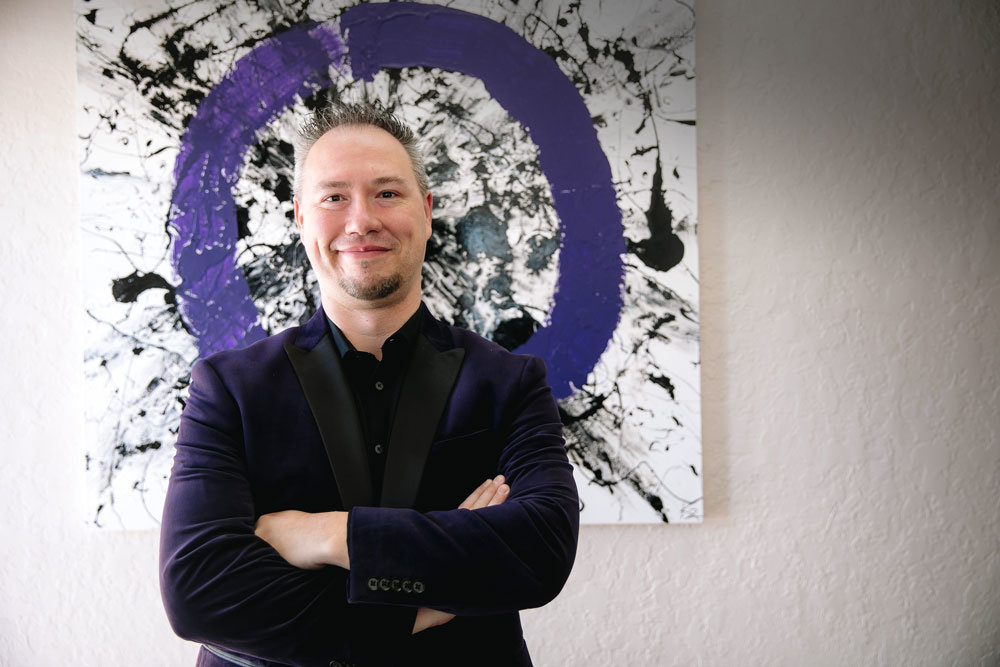YOUR BUSINESS AUTHORITY
Springfield, MO
YOUR BUSINESS AUTHORITY
Springfield, MO

Why did you concentrate your practice around the legal needs of entertainers and creative professionals?
My first career was in business management operations and then in the arts field. I decided to go a second route in the legal realm and continue to help and pursue the arts and creative business. I worked in a big law firm in Kansas City for a while. The legal world there really took care of those aspects in these niche areas, such as intellectual property and focusing on the contracts and business side of the creatives. I saw a need here in Springfield, and I’m a big proponent of the “why not here” philosophy. I wanted to bring that kind of education and support to business and artists and creatives in those realms of brand protection and contracts. That’s where RoundTable Legal came about.
The philosophy is based on the Arthurian legend of the roundtable, where we all get together at a table – you are the expert in your business area with your passion, I come in as the expert in business law, and we’ll bring other partners in that are experts in marketing or accounting. We all work together to build your success in the empire.
What was the first step to start?
I got a call from Jeff Houghton [of “The Mystery Hour” talk show] and he had some legal concerns and issues of things he wanted to discuss in the entertainment realm and was looking for someone in the Springfield area to help rather than going to those big cities – Kansas City, St. Louis, Nashville, that are really represented with the entertainment lawyers or intellectual property attorneys – that handle copyright and contracts. Because he had that need, and I saw that arts community so strong and the business community developing, that really led to that “why not here in Springfield?” to start this type of boutique.
What missteps do you see companies making when it comes to their brands and trademarks?
Everybody deals with trademarks on a daily basis. Trademarks are brands, and it’s important for businesses to understand why they’re important assets. A trademark could be the name to graphic design, the logo, slogan, color used, sometimes even a smell or a sound or shape of a product or building. There are a lot of famous trademarks out there, like the pink from Owens Corning insulation, the smell of Play-Doh, or the shape of a Coca-Cola bottle. That brand protection is so vital. Entrepreneurs will spend a lot of time and effort building that name and reputation with their clients and consumers, marketing and advertising, and it seems, to me, irrational not to protect what they’re building. It’s like building your dream home but not owning the land it’s on. Oftentimes entrepreneurs think, “I came up with this name, it’s mine and I own it.” That’s not how that works in the legal realm.
What are examples of your work?
I’ve done trademarks for small and midsize businesses in town: Bon Bon’s Candy House, on their logo, name and stylization; and Henry’s Towing. And I have clients around the country, too. A newer client is Proximal Strength, the gym, and Crystal Methyd, a local entertainer. She had her stage name trademarked. It can be anything.
Your firm is structured as a boutique and calls itself a “next generation law firm.” How are boutiques different than traditional firms? You might be biased, but is the large law firm business model dying?
As a boutique firm, you’re focused on specific areas of practice. Our practice focuses on businesses and entrepreneurs and creative entrepreneurs in the fields of intellectual property and contracts. I don’t handle a traffic issue or a family law case. There are attorneys who handle all aspects of the law. On larger firms, I don’t think they’re dying by any means. I’ve seen a lot of them have a little hesitation moving the way the climate is situated with video technology and things like that, but that’s just the nature of being a large firm and a lot of wheels to turn. As long as they stay fluid and open to innovation, they’ll be fine. But I’m very much a fan of the boutique firm. If you think of it like medicine, if you’ve got an issue with your kiddo and they need to have a procedure done on their ear or throat, you’re not going to a podiatrist. You’re going to someone who specializes in that area you’re looking to get help in.
Corey Kilburn can be reached at ckilburn@roundtablelegal.com.
Missouri State University’s science building, built in 1971 and formerly called Temple Hall, is being reconstructed and updated.